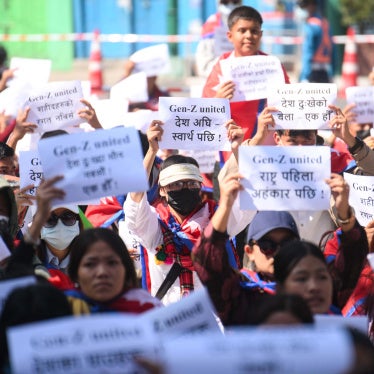(New York) - Singapore's stated goal of updating its political system in time for the 2011 elections should include revamping laws, policies, and practices that fail to comply with international human rights standards, Human Rights Watch said today in releasing its World Report 2011.
The 649-page report, Human Rights Watch's 21st annual review of human rights practices around the globe, summarizes major human rights trends in more than 90 countries and territories worldwide. In Singapore, during 2010, the government restricted freedom of expression, association, and peaceful assembly and frequently used defamation laws, and, in some cases, preventive detention, to silence political critics and human rights defenders.
Download the complete report > [PDF, 4 MB]
"Behind the facade of a dynamic and open Singapore promoted by the government is a more sinister reality of serious restrictions on civil and political rights and determination to maintain one-party rule," said Phil Robertson, deputy Asia director at Human Rights Watch. "Behind the sunny Singaporean smile featured in tourism ads, there are iron teeth prepared to deal with those considered a challenge to the government."
The government's intolerance of criticism was on full display in the case of the author Alan Shadrake, who alleged in his book Once a Jolly Hangman: Singapore Justice in the Dock, that Singapore's judiciary was subject to economic and political pressures from the ruling party and others when deciding cases under mandatory death penalty laws. Shadrake, a British national, was convicted on contempt of court charges for "scandalizing the judiciary," and sentenced to six-weeks in prison and ordered to pay a significant fine. His case is on appeal.
The government oversees an interlocking system of laws and regulations designed to curb expression of opposition views, whether through written materials, broadcast and electronic media, films, videos, public entertainment and meetings, or demonstrations and processions. This system is backed up by the courts' willingness to fine and imprison alleged violators for sedition, defamation, and contempt of court. The result is a system that effectively impedes citizens' ability to access these rights when engaged in electioneering, expressing political views, and seeking to expose past and present human rights violations by the government.
The Media Development Authority (MDA) under the Ministry of Information, Communication, and Arts, exercises broad licensing authority and censorship powers, and provisions in the Broadcasting Act, Films Act, the Newspaper and Printing Presses Act, and the Undesirable Publications Act elaborate on the authoritative reach of the MDA. Meanwhile, an Internet Code of Practice requires internet service providers, all government-owned or linked, and internet content providers to use their "best efforts to ensure that prohibited material is not broadcast."
Even at the public "Speakers Corner," set up by the government as an area for exercise of free speech, the government continued to operate five CCTVs that ring the area to monitor what is said, and speakers must register and show their national IDs before being allowed to speak. Those making addresses still risk running afoul of stringent sedition and criminal defamation laws.
The government seriously restricted the right to public assembly during 2010. The 2009 Public Order Act (POA) requires a permit for any "cause-related activity," defined as a show of support for or against a position, person, group, or government, even if only one person takes part. The POA further decrees that during so-called major events, police may issue "move on" orders for alleged disorderly conduct, and may ban filming of their operations if it endangers their officers. The practical result is that the Singapore High Court in March overturned an acquittal of several opposition Singapore Democratic Party (SDP) leaders accused of conducting a procession without a permit in September 2007. The SDP members had walked casually on a sidewalk wearing t-shirts with political messages, took time outs in their walk, and evidently hindered no one. The High Court nonetheless ruled that "evidence on record shows that the respondents had a political purpose for what they called a ‘walk.'"
Singapore also denies people their right to freedom of association through the broadly worded Societies Act, which requires all organizations with more than 10 members to register. Grounds for denial include purposes the government deems "prejudicial to public peace, welfare or good order" or "contrary to the national interest."
"As Singapore moves toward the elections in 2011, the government should demonstrate respect for civil and political rights that underpin a democratic society," Robertson said. "Gagging critics, imprisoning protesters, and imposing onerous restrictions on opposition parties and civil society only show that Singapore's democracy exists only on paper."
Laws that permit arbitrary arrest or detention in violation of international law, such as the Internal Security Act, Criminal Law (Temporary Provisions Act), and the Misuse of Drugs Act, should be repealed, Human Rights Watch said. The government's widespread use of corporal punishment also should end, starting with abolition of all laws and regulations that permit any form of caning for any reason including judicially sanctioned caning, caning in the military, in reform schools and prisons, and in secondary schools.
"Caning is a cruel punishment that is a form of torture," Robertson said. "Singaporean authorities should revoke laws permitting such practices that blight Singapore's claim to being a modern society."







